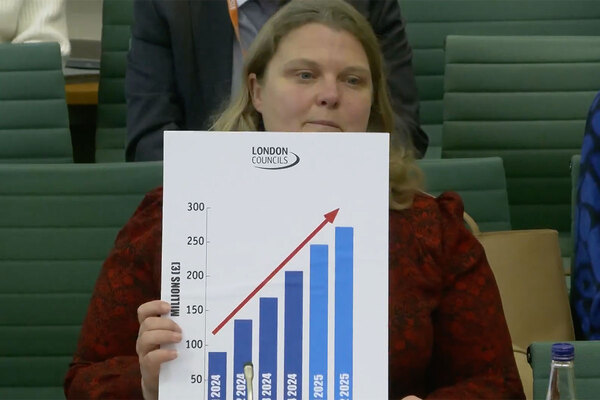Using data to deliver better services
How are landlords collecting data and using it to make decisions about asset management and meeting residents’ needs? An Inside Housing survey, with data analytics firm Switchee, finds out
In association with:
![]()
From asset management to delivering services and support to tenants, data can be a game-changer. It provides a strong foundation for better decision-making, with the potential to improve almost every aspect of the work done by housing providers.
But there can be obstacles. Data can be highly dispersed and tricky to collect. Social landlords can deploy a range of data-gathering methods to ensure they reach as many people as possible, from sensors, to web forms and phone surveys – but once gathered, the information from these disparate sources must be cleaned, organised and stored securely. All of this consumes resources – and the utility of this process depends on the quality of the data, which can depend, at least in part, on how well residents trust the landlord asking the questions.
Once this information is in the hands of landlords, it needs to be deployed effectively. How well are social landlords collecting, handling and using data to improve their business practices and service delivery, and to better support their tenants? And what are the challenges they face in meeting these objectives?
Inside Housing, in collaboration with data analytics and insights firm Switchee, conducted a sector and UK-wide survey to find out, with a focus on two main areas: asset management and meeting residents’ needs.
Effective asset management
First, the survey asked the 88 respondents how effectively their organisations are using data to inform decisions about asset management. Almost one in six organisations – 16% – said all of their asset management decisions are informed by data, while just over half said it informs many of theirs. While those results add up to a sizeable majority, 31% said few – or none – of their asset management decisions are data-led.
This may be down to a lack of trust in the quality of the underlying data itself. Organisations will find it hard to trust data-led decisions if they do not trust the data.
We asked which data-gathering methods generated the most reliable and useful asset management information. Three in four respondents pointed to reports from repairs and maintenance staff. The next three most popular answers involved feedback from residents – 58% cited residents’ reports shared over the phone or in writing, and 51% specified reports submitted via electronic channels, such as web forms or email, and reports from housing officers, which were cited by 55%.
We also asked what respondents saw as the biggest barrier to making data-led decisions around asset management. By far the most popular response – selected by 38% of respondents – was the lack of a single, consolidated source of data. It is easy to see why; if the requisite information is held in different places or on different systems, it becomes a much more complex and time-consuming task to collate and compare it.
That response was doubly as popular as the next most commonly cited obstacle – a lack of high-quality data, chosen by 16% of respondents, while 9% pointed a finger at insufficient data analysis resources; in other words, the data is there, but they lack the capacity or skills to process it effectively.
“This survey provides key insights into the current landscape of data management within the housing sector,” says Kate Roberts, head of customer success at Switchee. “Housing associations report using a multi-source approach to data-gathering – and yet despite this diversity of data collection methods, significant challenges remain. Notably, almost one in six participants highlighted a lack of high-quality data, while more than a third pointed to the absence of a consolidated data source, underscoring the need for both accurate data collection and integrated systems.”
The shift towards more data-led decisions may also require a shift in organisational culture. One respondent, who works as a data officer at a housing association, commented that they felt their employer is still only paying lip service to data collection and management: “Asset management and use of data within the organisation appear at times to be buzzwords,” they wrote. “While within my own team, the use of data and how it is one of the drivers of our decision-making is well-known, within the company as a whole, it’s less understood and has required active measures and training for housing and customer-facing staff to recognise data collection opportunities.”
Resident need
The second half of the survey focused on how social landlords collect and deploy data to better meet residents’ needs. Almost one in five respondents – 18% – said their organisation does this ‘very well’, while 43% said they do this ‘fairly well’. The proportion who answered ‘poorly’ or ‘very poorly’ – where few or none of their decisions on resident need are data-led – were 28% and 10% respectively, meaning more than a third believe their organisations are not yet making the best use of data to support their residents.
The survey then asked which collection methods produced the most reliable and useful data on residents’ needs. The two most popular responses were resident reports shared over the phone or via letters, and reports from repairs and maintenance staff (59% and 57% respectively). Reports from housing officers were cited by 56%, and in fourth place were reports from residents shared electronically (44.3%).
16%
Respondents that said all their asset management decisions were informed by data
80%
Proportion that said reports from repairs staff were the most reliable data-gathering method
38%
Those that said a lack of one data source was the biggest barrier to making decisions
64%
Proportion that felt well-equipped to make decisions using the data
Respondents were able to choose more than one collection method, and the total number of responses – 232 – was around 14% lower than the responses to the equivalent question on asset management (265 responses). This could suggest individual organisations are basing service delivery decisions on data gathered via a more limited range of approaches.
Finally, we asked how well equipped respondents felt to make decisions grounded in data. More than 60% said they were either ‘very well’ or ‘well equipped’ to do so (11% and 52% respectively) – but more than one in three reported feeling either ‘poorly equipped’ (32%) or ‘very poorly equipped’ (5%) to do so, which suggests a need for dedicated training and education around making use of data to add value.
In the round, the survey results describe a data-led revolution that is well under way in the sector, and delivering real benefits – but it suggests, too, that there is still plenty of work to be done to maximise the value of this increasingly valuable resource.
“As an organisation committed to leveraging the power of data to optimise outcomes for housing associations and their residents, we welcome these findings,” says Ms Roberts. “They shed light on crucial areas for improvement and affirm the importance of building accurate data collection systems, enhancing data management and helping individuals feel empowered to make data-informed decisions.”
Recent content in association with Switchee
CPD webinar on demand: fostering data-driven engagement with residents on fuel poverty
As part of Inside Housing’s CPD offering, watch the full webinar and earn CPD minutes
How can social landlords use data to tackle fuel poverty?
As we enter winter and fuel bills spike, half of social tenants cannot afford to heat their homes, but identifying who those tenants are remains a challenge. Here, sector leaders discuss how better use of data could fight energy poverty
UK fuel poverty: a cool summer affects results
In the fourth Housing Fuel Poverty Index update of 2024, Inside Housing looks at the numbers reported by Switchee’s smart thermostats to help track fuel poverty across the UK
CPD webinar on demand: how can social landlords assess whether retrofit is delivering intended performance improvements?
As part of Inside Housing’s CPD offering, watch the full webinar and earn CPD minutes
What do the latest fuel poverty stats tell us?
In the third Housing Fuel Poverty Index update of 2024, Inside Housing looks at the numbers reported by Switchee’s smart thermostats to help track fuel poverty across the UK
CPD module: how to approach decarbonisation policy and strategies
The policy environment on decarbonisation and retrofit is evolving, so how can social landlords continue to build strategies to meet net zero? Richard Ellis, director of sustainability at Peabody, explains in this CPD module
What will Awaab’s Law mean for landlords and residents?
An Inside Housing roundtable, in association with Switchee, discusses how incoming legislation will affect how landlords approach repairs and maintenance in their homes
Using data to deliver better services
How are landlords collecting data and using it to make decisions about asset management and meeting residents’ needs? An Inside Housing survey, with data analytics firm Switchee, finds out
Is fuel poverty on the decline?
The latest data from smart thermostat provider Switchee suggests that the fuel poverty crisis may be starting to ease. Inside Housing analyses the figures
The numbers behind fuel poverty in the UK
Switchee’s new model shows the number of social households underheating their homes across the UK in real time, during 2022 and 2023. Inside Housing looks into the figures
How can landlords help residents to save on energy bills?
Inside Housing speaks to Emma Bitting at Switchee to find out what residents can do to ensure their homes are warm, and how they can save money on bills
How landlords are using data to tackle fuel poverty
An Inside Housing roundtable, in association with Switchee, discusses how landlords can analyse data to ensure they are helping residents who are struggling with energy costs
Internet of Things devices start to make a difference
A national network of vetted installers means the industry can collaborate to provide landlords with invaluable insights, says Philip Taylor of Internet of Things device provider Switchee
Choosing smart data and tech can help landlords achieve Better Social Housing Review goals
Technology can help landlords in terms of their business and regulatory compliance, as well as improving residents’ quality of life and bringing down bills, explains Tom Robins of tech firm Switchee
Sign up for our asset management newsletter
Already have an account? Click here to manage your newsletters












